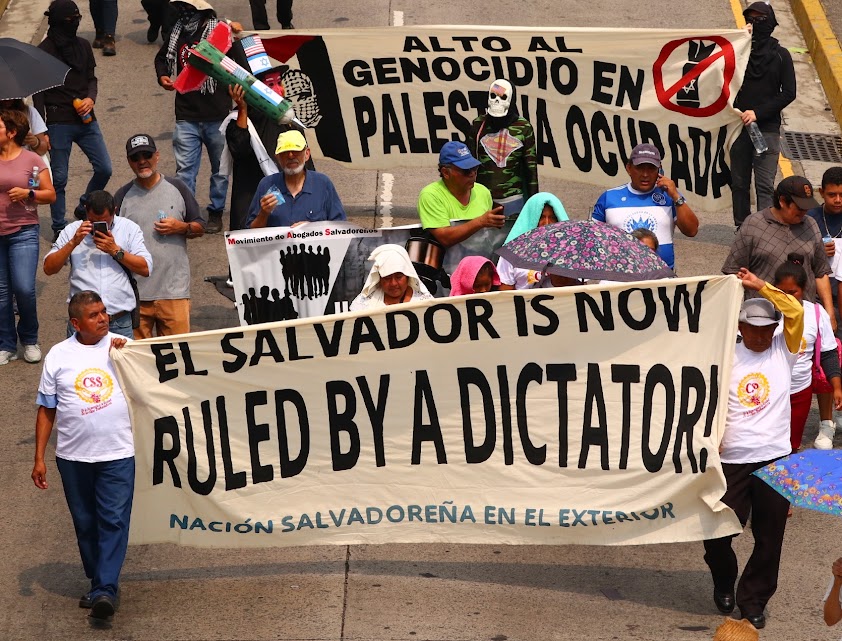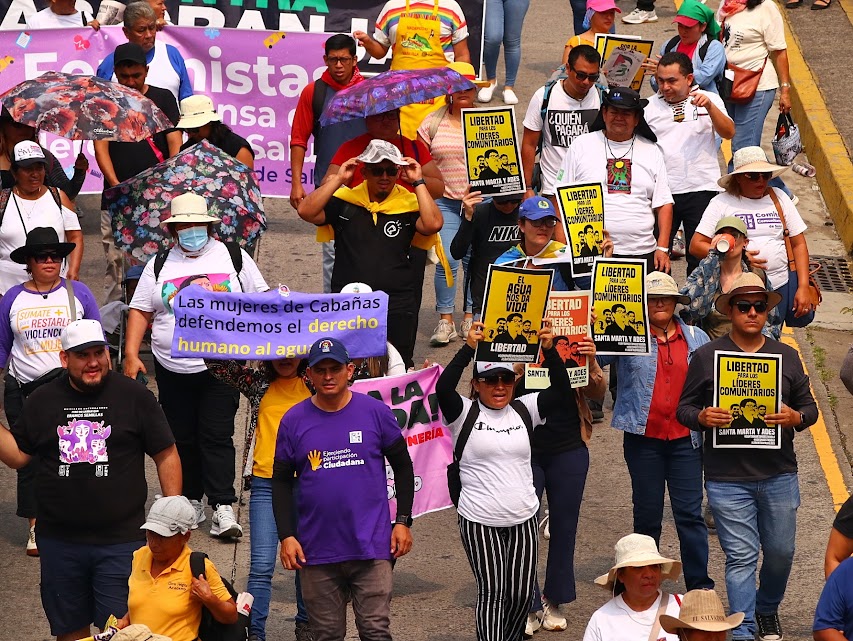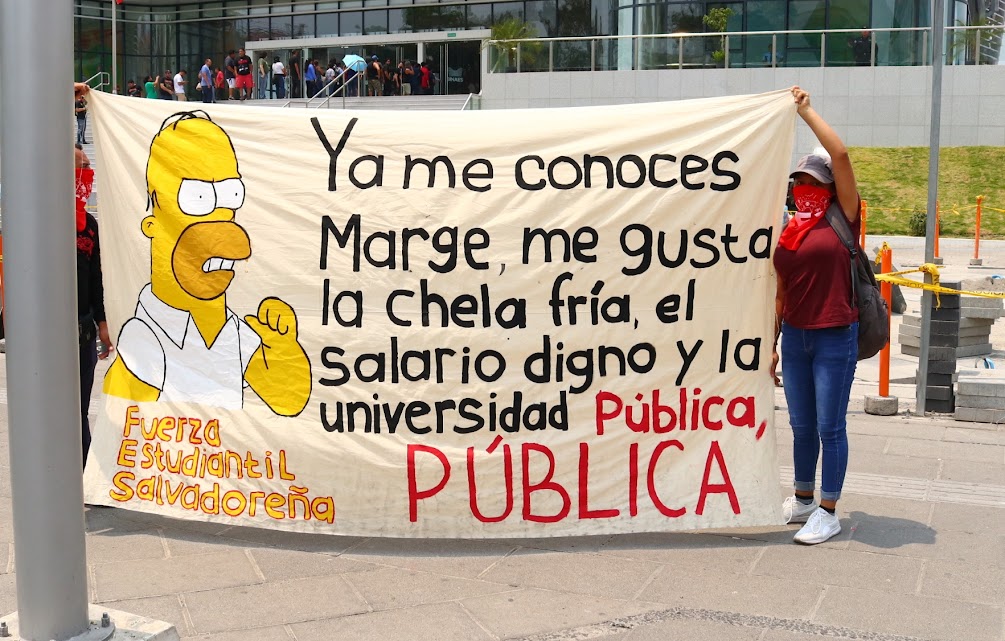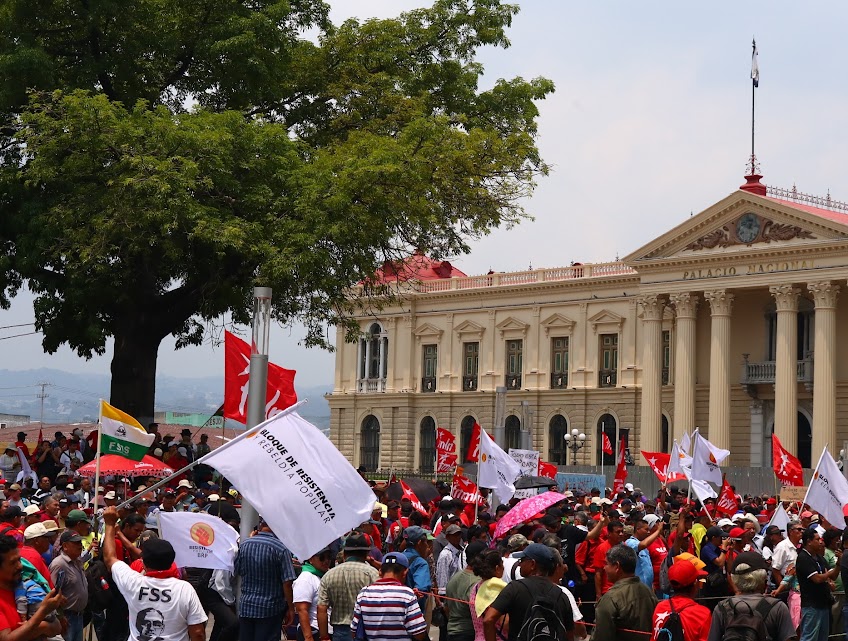“With Unity, Struggle, and Organization, We Will Rescue the Nation!”
Salvadorans took to the streets Wednesday morning to mark May Day and call for a unified opposition to Nayib Bukele’s government, widely denounced for setting back the struggle for workers rights to conditions similar to those under pre-civil war military dictatorships. March organizers, which include the Popular Resistance and Rebellion Bloc (BRP), the National Alliance for a Peaceful El Salvador, and the Labor Union Coordinating Committee- October 31 (CUS-31) were joined by thousands of Salvadoran workers and activists to decry the high cost of living and an end to the erosion of democracy and human rights under the Bukele regime.
Building on demands from the March 8th International Women’s Day march, protesters reiterated their call for an increase in the minimum wage, which the government is required to address this year. Since the last minimum wage increase in 2021, the cost of living has gone up 31%. While the minimum wage ranges between $243 and $365 depending on the sector, the cost of living is $510 in urban areas and $366 in rural zones.

Photo: CISPES
Thousands of Salvadorans took part in the massive march, which started at the Salvador del Mundo Plaza and ended in the historic Civic Plaza, in front of the government’s National Palace and the San Salvador Cathedral. As was the case with the 2023 May Day march, the government set up police checkpoints around the country, detaining buses on their way to the march. In one case, prominent human rights defender Ingrid Escobar of Socorro Jurídico Humanitario (Humanitarian Legal Aid) reported being stopped with a group traveling from Espíritu Santo Island in the eastern part of the country. Police took their identification cards and took photos of everyone on the bus. Community members from the isolated island have been vocal about arbitrary detentions of 25 fishermen and water taxi drivers under the country’s State of Exception. A bus of union members traveling from the western Usulutan department was also stopped at a checkpoint by heavily armed police.
Marchers also called for an end to the country’s State of Exception, now in place for over two years. A large contingent from the Victims of the Regime Movement (MOVIR) wore t-shirts and held posters with the faces of their family members who remain imprisoned under the State of Exception. Sixteen union leaders have also been jailed under the measure, which suspends basic civil liberties and has extended pre-trial detention periods for up to four years. Sonia Urrutia, a leader of the BRP and Secretary General of the Union Federation of Workers for Labor Justice of El Salvador (FESTRAJUSAL) condemned the detentions. “We must denounce the arbitrary arrests of our union comrades who have been imprisoned under the State of Exception on the grounds of unlawful associations. It should be emphasized that our union comrades who have been arrested were imprisoned simply for demanding their benefits and salaries as workers.”
Two union leaders have died in prison under the State of Exception. José Bonilla, who died in October 2023 under state custody, had his charges dropped on the day of his funeral. Human rights organizations have called for an investigation into his death, as his autopsy revealed signs of torture. To date, their calls have gone unanswered. The death of Hever Chacón, a union leader who worked as a vendor at San Salvador’s Eastern Terminal Bus Station, was reported at the end of March.

Photo: CISPES
Palestinian flags and signs calling for an end to the genocide in Gaza could also be seen throughout the march. There has been a consistent and growing presence of solidarity with the Palestinian struggle at marches in El Salvador since October, with protesters highlighting the U.S. role in funding the Israeli military.
Marchers also condemned the Bukele government’s attacks on the public sector workforce. Over 20,000 government workers have been laid off since Bukele took office in 2019 as a result of reducing and closing government institutions with twelve unions having been erased in the process. 500 unions have also been denied credentials from the Labor Ministry. Without credentials, unions cannot negotiate collective bargaining agreements and union leaders are left without legal protections guaranteed under the law. To date, 150 union leaders have been fired and another 40 have been suspended. Urrutia, in a pre-march interview on April 25, placed the blame directly on Bukele: “We are facing a government in which the main violator of labor and union rights is President Bukele, as he has not respected any legal norms.”

Photo: CISPES
In addition, an August 2023 law, passed by Bukele’s Nuevas Ideas (New Ideas) party in the Legislative Assembly, reduced the number of municipalities in the country from 262 to 44. Fran Omar Parada of the BRP, referencing the transition of power also taking place Wednesday, said “The situation that the new municipalities will be encountering is going to be complicated…because, due to the reduction in the number of municipalities, we could see a wave of layoffs in the former municipalities that will now be districts.” Though the new local governing structures remain unclear, the change will likely perpetuate the concentration of power pursued by Bukele since becoming president. According to Parada, “The districts will be controlled by the executive branch. That is to say that the executive will appoint managers in the districts that were previously municipalities, in line with the logic of generating greater [central government] control in rural communities.”
New legislative deputies, whose numbers have also been reduced from 84 to 60, also took office Wednesday. Their predecessors on Monday voted to make a significant change to the constitution which, if ratified as expected by the incoming Nuevas Ideas supermajority, would allow further constitutional changes with a three-fourths majority vote. This move was criticized at Wednesday’s march as the latest government attack on the country’s democratic system.

Photo: CISPES
Students and professors from the University of El Salvador also had a significant presence at the march. The Salvadoran Student Force (FES) and the professor-led University Movement for Critical Thought (MUPC) of the BRP led a contingent demanding funding for the country’s lone public university. The government has underfunded the university for years, compiling a debt of $52 million, forcing it to close programs and lay off faculty.The UES is a historic center of leftist organizing and has remained largely shuttered since the beginning of the COVID-19 pandemic. Since 2020, the government has militarized the campus, and has usurped its facilities for international spectacles, like the Miss Universe pageant and the Central American and Caribbean Games. During the highly-irregular recount following February’s presidential and legislative elections, Bukele’s Nuevas Ideas party used the campus for private meetings and rallies.
As Bukele’s first term comes to a close, this massive turnout was seen as a breath of hope for many in the midst of a dismal landscape. With Bukele’s illegal second term to begin in one month and a slate of constitutional amendments on the docket, Ana Silvia Navarette of the National Confederation of Salvadoran Workers (CSTS), reflected on the current moment: “We are convinced that we are on the right path. This isn’t the first time we’ve been in this position. In the past, we have come out ahead and we will do it again now...This is an opportunity to reinvigorate the spirit of struggle amongst unions.”


 "I am a CISPES supporter because continuing to fight for social justice and a more people-centered country means continuing the dream and sacrifice of thousands of my fellow Salvadorans who died for that vision.” - Padre Carlos, New York City
"I am a CISPES supporter because continuing to fight for social justice and a more people-centered country means continuing the dream and sacrifice of thousands of my fellow Salvadorans who died for that vision.” - Padre Carlos, New York City

